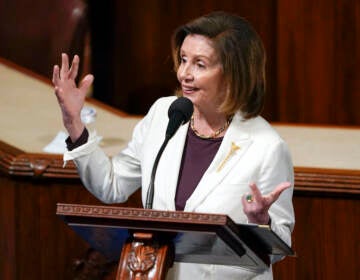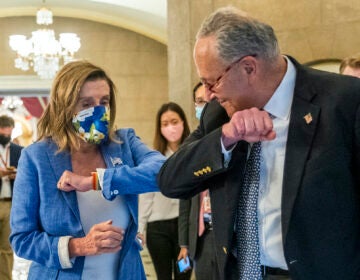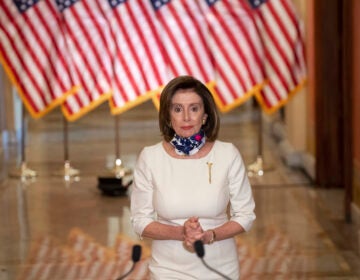Dems push $3T coronavirus relief bill toward House OK
Democrats pushed Congress’ biggest coronavirus relief bill yet toward expected House passage Friday, a $3 trillion behemoth they said a beleaguered country badly needs.
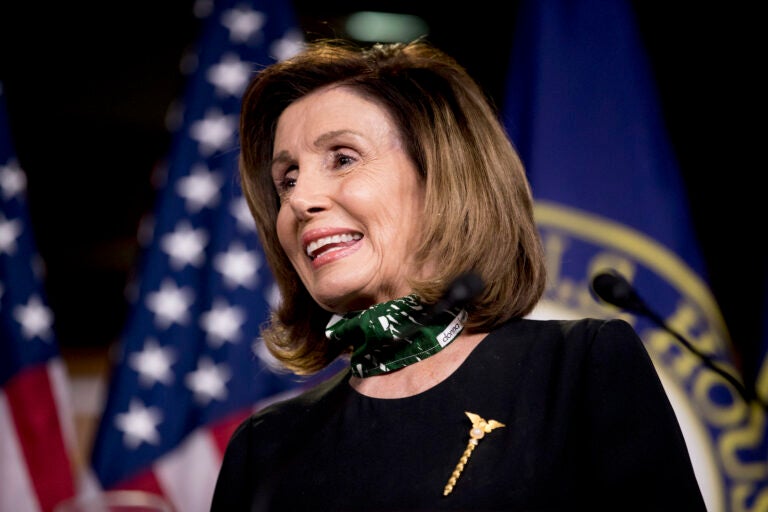
House Speaker Nancy Pelosi of Calif., smiles during a news conference on Capitol Hill, Thursday, May 14, 2020, in Washington. (AP Photo/Andrew Harnik)
Democrats pushed Congress’ biggest coronavirus relief bill yet toward expected House passage Friday, a $3 trillion behemoth they said a beleaguered country badly needs but Republicans called a bloated election-year wish list.
Democratic leaders were pressing ahead despite grumbling from party moderates leery of the measure’s massive price tag and liberals who wanted bolder steps, like money to cover workers’ salaries. The measure cleared an early procedural hurdle 207-199 with 14 Democrats voting in opposition, an unusually high number of “no” votes but small enough to suggest that leadership had things under control.
The bill was sure to go nowhere in the GOP-led Senate, let alone reach President Donald Trump’s desk, where a promised veto awaited. House Speaker Nancy Pelosi, D-Calif., has said the legislation is Democrats’ opening offer in what is expected to blossom into negotiations with the White House and congressional leaders of both parties.
In a scene that’s become uncomfortably familiar since the virus took hold, the sparsely populated House chamber was dotted with members and aides wearing protective masks, though some Republicans were not.
There were few clusters of chatting lawmakers and Pelosi edged away from those stepping near her. Each vote was expected to last an hour or more, with members voting in alphabetical order in groups of around 70 to reduce crowding.
The bill would flush almost $1 trillion to state and local governments and provide more money for virus testing and to pay front-line emergency workers. It would renew $1,200 cash payments for individuals and extend the added $600 weekly unemployment benefits being paid during the pandemic.
Democrats rejected GOP arguments that the measure was simply an effort by Democrats to display their priorities to voters.
“I don’t give a damn about sending a message,” said Rep. Jim McGovern, D-Mass. “I want to send help to those in desperate need.”
Pelosi has loaded the 1,815-page measure with a slew of Democratic priorities, including funding to cover rent payments and utility bills, “hazard pay” for essential workers. It also has grants to thousands of municipal governments grappling with sagging revenues and provisions helping voters cast ballots by mail and increasing food aid to low-income people.
“Phase Four is going to happen,” Trump told reporters in the Oval Office, using Washington insider-speak for the measure. “But it’s going to happen in a much better way for the American people.”
Trump provided no detail, but has said the next measure should protect reopening businesses from liability lawsuits and cut payroll taxes.
Few Republicans were expected to back the bill, despite popular provisions that also included help for the Postal Service and local schools and $175 billion to help homeowners and renters stay in their homes.
“This bill is nothing more than the Democratic policy agenda masquerading as a response to the coronavirus crisis,” said Rep. Tom Cole, R-Okla. He said the bill is “going nowhere, and is going nowhere fast.”
Democratic leaders were working to limit their own defections and avert what would be a politically damaging defeat. In a conference call with Democrats late Thursday, Pelosi cautioned her colleagues against voting no.
“If you vote against this and all this funding for your state, then you have to go home and defend it. And if you can defend that no vote, then you’re a better politician than me,” Pelosi told them, according to a Democratic aide who spoke on condition of anonymity to describe the private discussion. Her remarks were first reported by Politico.
That didn’t stop some Democrats from both ends of the party’s spectrum from planning to vote no.
Freshman Rep. Cindy Axne, D-Iowa, facing a competitive reelection in a GOP-leaning district, labeled the measure “bloated” in a statement. Liberal Rep. Pramila Jayapal, D-Wash., told reporters that if constituents ask her if the bill would put money in their pockets or preserve their health care, “I can’t tell them yes.”
The legislation comes as the country continues to struggle with the health and economic crisis caused by the highly contagious virus, which has claimed more than 85,000 lives in the U.S. and caused at least 36 million people to lose their jobs.
The response has been an unprecedented wave of deficit-financed federal aid aimed at propping up businesses, supporting household balance sheets, and pay for a massive health system response. On Wednesday, Federal Reserve Board Chairman Jerome Powell urged lawmakers to act further, warning that the economic shock is “significantly worse” than any downturn since the Great Depression.
The government’s budget was supposed to be $4.6 trillion even before the pandemic hit. The growing mountain of government debt has made GOP deficit hawks uneasy about the prospect of more aid. And polls show Republican voters think the government is generally doing enough.
Republicans are now calling for a “pause” before considering more aid, reflecting disunity between conservatives who feel enough has been done and more pragmatic lawmakers who favor steps like rescuing the Postal Service from looming insolvency, while delivering cash to revenue-starved state and local governments.
Underscoring the stakes, it’s also becoming clear that the next coronavirus response bill will probably be the last.
“I think the bill we pass in June will likely be the last major bill,” said Sen. Roy Blunt, R-Mo. “There may be some effort to pass a bill in September or October but it will get increasingly difficult.”
The House Democrat’s bill ignores Trump’s demand for a cut in the Social Security payroll tax, It also does not replenish the Payroll Protection Program that’s been a favorite of Republicans and their business allies.
AP reporters Lisa Mascaro, Jill Colvin and Laurie Kellman contributed reporting.
WHYY is your source for fact-based, in-depth journalism and information. As a nonprofit organization, we rely on financial support from readers like you. Please give today.


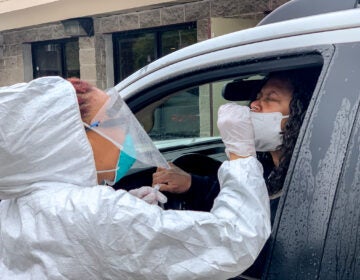
![CoronavirusPandemic_1024x512[1]](https://whyy.org/wp-content/uploads/2020/03/CoronavirusPandemic_1024x5121-300x150.jpg)
